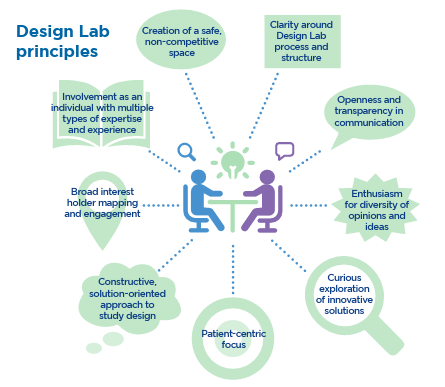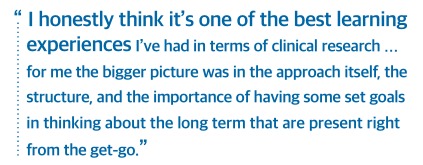 Tufts CTSI’s Clinical Trial Design Labs are a powerful demonstration of Tufts CTSI’s mission to support broadly engaged team science at the earliest stages of research. Design Labs bring together experts from across the intervention development pathway to support innovative study teams. Teams with an original clinical trial idea are guided to think about the health impact they want to have and which interest holders are key decision makers. Clinicians, patients, researchers, funders, industry experts, policy experts, regulators, and payers come together to discuss each study design and chart a path to impact.
Tufts CTSI’s Clinical Trial Design Labs are a powerful demonstration of Tufts CTSI’s mission to support broadly engaged team science at the earliest stages of research. Design Labs bring together experts from across the intervention development pathway to support innovative study teams. Teams with an original clinical trial idea are guided to think about the health impact they want to have and which interest holders are key decision makers. Clinicians, patients, researchers, funders, industry experts, policy experts, regulators, and payers come together to discuss each study design and chart a path to impact.
In 2016, Tufts CTSI began collaborating with colleagues leading the New Drug Development Paradigms (NEWDIGs) group at Massachusetts Institute of Technology (MIT). NEWDIGs developed the Design Lab concept as a way to create space for multiple interest holders to collaborate on patient-centered biomedical innovation. Tufts evolved this methodology to support clinical trial Design Lab principles Creation of a safe, non-competitive space Involvement as an individual with multiple types of expertise and experience ô Broad interest holder mapping and engagement Clarity around Design Lab process and structure Openness and transparency in communication Constructive, solution-oriented approach to study design Enthusiasm for diversity of opinions and ideas Curious exploration of innovative solutions Patient-centric focus design, and the first Design Lab, focused on innovations in clinical effectiveness trials, was held in 2017. Since then, CTSI has convened Design Labs with teams from CTSA hubs located across the country, and NEWDIGs has joined the Institute for Clinical Research and Health Policy Studies at Tufts Medical Center.
By 2022, Tufts had run Clinical Trial Design Labs with 12 study teams developing a variety of drug, device, and behavioral interventions for specialty areas including neurology, cardiology, pulmonology, and pain medicine, as well as pediatric and adult rare disease. Study teams emphasized the importance of structured collaboration and eliciting the diverse perspectives of different experts with complementary insights. In qualitative interviews following the Design Lab event, study teams reported that the process led to innovative methods development, changes in trial design, improved recruitment efforts, and identification of pathways to funding and market access. Those involved with Design Labs were excited about its potential and asked that there be more opportunities for investigators and study teams to take part.
The positive experiences reported by investigators, teams, and expert interest holders, and the potential for greater benefit led Tufts to be awarded a CTSA supplement in 2023 to develop a flexible toolkit of materials that would support others to develop and run Design Labs. Mara Palm, PhD, MSc, and Harry Selker, MD, MSPH, led these efforts with a team of faculty and staff at Tufts. They worked in partnership with an advisory committee composed of strategic and operational leaders within the Trial Innovation Network and CTSA consortium and individuals with expertise in engagement science, implementation science, and translational research education.
The Design Lab Toolkit (1) was launched in July 2024 and includes an introduction to the Design Lab methodology and principles, step-by-step program development guidance, an overview of resources required, and an appendix with examples, tools, and templates. It can be used as a guide to develop and implement a Design Lab program or as a tool to understand the methodology and apply it to other translational research activities. Design Labs are a broadly engaged team science intervention that harness the power of different types of expertise and support innovative design and translation to health impact.
- ME Palm, P Beninger, D Daudelin, N Duenas, G Hirsch, K Markman, E Reed, L Trinquart, M Trusheim, C Wieber, LC Welch, and HP Selker (July 2024). Design Lab Toolkit. Tufts Clinical and Translational Science Institute. DOI: 10.60965/4zbg-qc75


